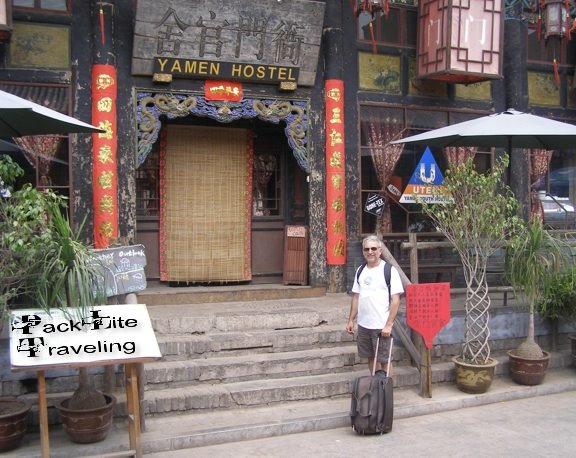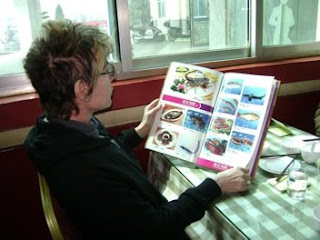This article appeared in the April 26 Wooster Daily Record
__________________________
Ni hao. Hello from Kaifeng, China, where I am teaching at Henan University for a semester.
Preparing to come to China, I spent a lot of time on my courses. I assumed the Chinese know a lot about America from TV, movies and other sources.
Once I started teaching I re-learned the old saw about what "assume" makes out of you and me.
Perhaps in more sophisticated big cities such as Beijing and Shanghai people have a fairly accurate vision of the West. But here in the provinces we are as mysterious as ... well, as the Chinese are to us. I think the students at Henan University have a fragmentary picture of America. It's like they've got several pieces of a jigsaw puzzle but many are missing.
There is a fundamental difference so great it makes each of us incomprehensible to the other. The soil of China has grown and nurtured its people and their culture like a strong and very old tree. Although there are tribal minorities here, 92 percent of the population is from one root. That makes the Han the largest ethnic group in the world. With the exception of a few areas this is a homogeneous society.
America is a ground on which a great variety of seeds have been transplanted. There are trees growing from everywhere. Every nation, every tribe, every religion, large and small, is represented. In this variegated forest cross-pollination has taken place. So many of us are multi-hyphenate. "I'm Irish-French-German-Cherokee." Like the plant researchers at ATI, sociologists keep busy studying the profusion of cultures and subcultures that never stop appearing in our country.
We Americans are not accustomed to such a large number of people who despite regional peculiarities are more alike than different. Chinese can't quite grasp the motley variety of America.
My students are forever asking what Americans think and how they act. Perhaps they think I am evasive when I keep stressing that Americans hardly ever agree on anything -- politics, religion, lifestyle, education, you name it. I find myself saying over and over we argue about everything but somehow we make it work. And the arguments actually are healthy. We're being Americans by making choices, holding beliefs and voicing opinions.
That doesn't compute. Chinese value harmony. Dissent is rare and muted. In unanimity there is strength.
"In China, all the things we learn are not allowed to doubt about," one of my students complained. "The books and the teachers mean the authority, especially in primary and high schools. All we learn is just to remember the facts and the principles. If you have a very creative thought or if you think in the other way around, instead of praising, the teachers will laugh at you or persuade you to give up that 'stupid' idea, for you are wasting your time on a thought which won't gain a single point on your college entrance examination (just like SAT in America). Maybe this is the reason why we can't think out of the box."
Another of my students shared with me her ambition to study in Germany. She said my classes are helpful because she must learn to think like a Westerner. Chinese tend to see the big picture, she explained, but aren't interested in the details. Westerners are more committed to a thorough exploration of the facts and logical organization of data before reaching a conclusion.
That's the way we're taught to think. That's the way I set up my courses and teach. It's an approach so ingrained I hadn't considered that students here might view it as unusual or instructive unto itself.
At the heart of it all is an essential difference. The Chinese value most highly membership in the community. To belong to the family, the village, the group, the society, the country -- that's of paramount importance.
For Americans individualism is part of our creed and character. We pay the price of being disputatious and stubborn. We work hard to balance our unique identity with the need to work and live with others. Here in China, I'm reminded it makes us quite different.
While at home, it's easy to get caught up in the divisions that are part of our everyday lives -- Democrats vs. Republicans, believers vs. nonbelievers, Steelers vs. Browns. Half a world away, I'm learning a lot about the great, glorious stew that is my country just by having to explain it to others.





 We stayed in the Shuyuen Youth Hostel which I recommend highly. Located next to the city’s South Gate with a patient, friendly, helpful young staff. A very good restaurant. I had coffee regularly for the first time in two months, great breakfasts, and even pizza, for which there was a wood-fired oven right off the restaurant. The hostel may be justified in its boast that the basement bar is one of the best in the city.We met an interesting character, Steve of Missouri, who might have been the only person in the hostel older than I. Every two years he comes to Xi’an and stays in the hostel for 55 days. Never saw him go out in my 4 days there, he just hung around talking with guests, visitors, and the staff.
We stayed in the Shuyuen Youth Hostel which I recommend highly. Located next to the city’s South Gate with a patient, friendly, helpful young staff. A very good restaurant. I had coffee regularly for the first time in two months, great breakfasts, and even pizza, for which there was a wood-fired oven right off the restaurant. The hostel may be justified in its boast that the basement bar is one of the best in the city.We met an interesting character, Steve of Missouri, who might have been the only person in the hostel older than I. Every two years he comes to Xi’an and stays in the hostel for 55 days. Never saw him go out in my 4 days there, he just hung around talking with guests, visitors, and the staff.

















 The Chinese students do many outings with their classes. I was invited on the spring outing for the Foreign Language postgraduates (grad students in the USA) and was happy to accept, especially since it was my first visit to the Yellow River. The Huang is called the Mother River since Chinese civilization first grew up around it.
The Chinese students do many outings with their classes. I was invited on the spring outing for the Foreign Language postgraduates (grad students in the USA) and was happy to accept, especially since it was my first visit to the Yellow River. The Huang is called the Mother River since Chinese civilization first grew up around it.